SUMMARY
This is AI generated summarization, which may have errors. For context, always refer to the full article.
- Thailand soars with 18.9% growth
 It’s not a bird nor an airplane. It’s the Thai economy. This Asian nation soared by an eye-popping 18.9% in the 4th quarter of 2012. It’s a record performance that was attributed to low base in the same quarter in 2011 and recovery efforts that allowed the industrial sector to move past the devastating impact of the worst flood in decades. After growing a meager 0.1% in 2011, when floods swamped 65 of the 77 provinces in the country and crippled production in the auto and electronics sectors, Thailand performed a remarkable 6.4% in 2012, putting it on par with Philippine’s 6.6% performance and Indonesia 6.23%.
It’s not a bird nor an airplane. It’s the Thai economy. This Asian nation soared by an eye-popping 18.9% in the 4th quarter of 2012. It’s a record performance that was attributed to low base in the same quarter in 2011 and recovery efforts that allowed the industrial sector to move past the devastating impact of the worst flood in decades. After growing a meager 0.1% in 2011, when floods swamped 65 of the 77 provinces in the country and crippled production in the auto and electronics sectors, Thailand performed a remarkable 6.4% in 2012, putting it on par with Philippine’s 6.6% performance and Indonesia 6.23%.
Read more on Rappler. - Leave Sabah, Filipino claimants told
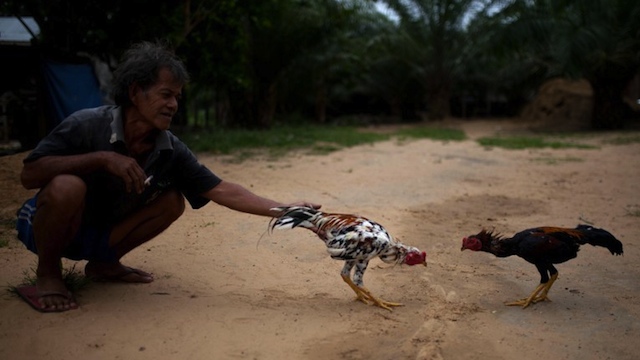 The group of Filipinos who crossed into the Malaysian state of Sabah to reclaim it as their territory last week should “leave peacefully to prevent further bloodshed.” The Department of Foreign Affairs said on February 18 it is coordinating with the Malaysian government to resolve the claims issue through negotiation. Security officials in Sabah are planning to deport the Filipinos back to Tawi-Tawi but sea travel are hampered by bad weather. The southern Philippine-based Islamic sultanate once controlled parts of Borneo, including the site of the standoff. Its heirs have been receiving a nominal yearly compensation package from Malaysia under a long-standing agreement for possession of Sabah.
The group of Filipinos who crossed into the Malaysian state of Sabah to reclaim it as their territory last week should “leave peacefully to prevent further bloodshed.” The Department of Foreign Affairs said on February 18 it is coordinating with the Malaysian government to resolve the claims issue through negotiation. Security officials in Sabah are planning to deport the Filipinos back to Tawi-Tawi but sea travel are hampered by bad weather. The southern Philippine-based Islamic sultanate once controlled parts of Borneo, including the site of the standoff. Its heirs have been receiving a nominal yearly compensation package from Malaysia under a long-standing agreement for possession of Sabah.
Read more on Rappler. - Philex pays ‘cash’ for P1-B mine leak fine
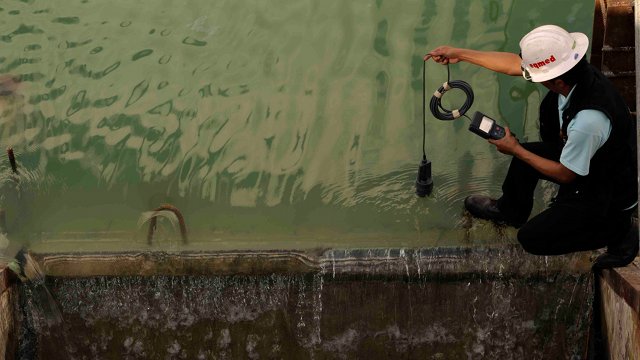 Philex Mining Corp. settled in full and in cash-like instrument the P1.034 billion penalty the government imposed over violations of the Mining Act. This staggering amount is part of the P4 billion total cost the gold producer said the Padcal tailings pond leak incident in Benguet province last August 2012 has cost Philex. The company also faces another fine — which has been stacking up since the P92.8 million penalty was announced in 2012 — over violations of the Clean Water Act. Philex has previously appealed the penalties, saying the incident was due to force majeure. Environment Secretary Ramon Paje has denied these appeals and stressed that imposing the penalties send the message that the government is serious about the environmental impact of the mining incident.
Philex Mining Corp. settled in full and in cash-like instrument the P1.034 billion penalty the government imposed over violations of the Mining Act. This staggering amount is part of the P4 billion total cost the gold producer said the Padcal tailings pond leak incident in Benguet province last August 2012 has cost Philex. The company also faces another fine — which has been stacking up since the P92.8 million penalty was announced in 2012 — over violations of the Clean Water Act. Philex has previously appealed the penalties, saying the incident was due to force majeure. Environment Secretary Ramon Paje has denied these appeals and stressed that imposing the penalties send the message that the government is serious about the environmental impact of the mining incident.
Read more about P4-billion mine leak cost on Rappler.Read more about the settlement of the P1-billion fine on Rappler.
Read more about the pollution-related fines on Rappler. - DSWD shrugs off payroll padding woes
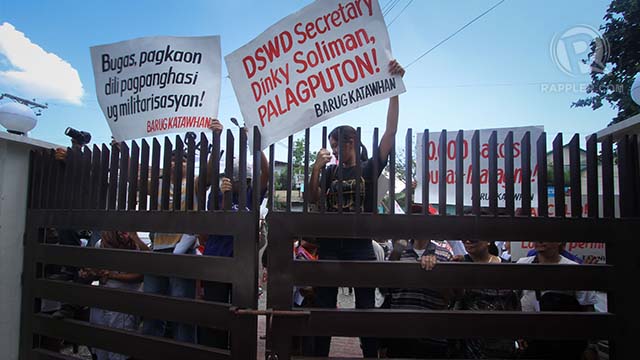 The Social Welfare Department denied involvement in the alleged payroll padding and overpricing in the construction of bunkhouses for typhoon “Pablo” victims in Compostela Valley. In a statement, the government agency explained it hired a contractor who, in turn, was in charge of hiring and paying a team of about 10 workers — a process that it could submit supporting documents on when the Commission on Audit conducts another check. An organization of typhoon victims shrugged off the Chinese wall between the government and the workers, some of whom claimed their signatures were forged in the job order forms that showed varying amounts. Barug Katawhan wants the government agency to take command responsibility over the discrepancies.
The Social Welfare Department denied involvement in the alleged payroll padding and overpricing in the construction of bunkhouses for typhoon “Pablo” victims in Compostela Valley. In a statement, the government agency explained it hired a contractor who, in turn, was in charge of hiring and paying a team of about 10 workers — a process that it could submit supporting documents on when the Commission on Audit conducts another check. An organization of typhoon victims shrugged off the Chinese wall between the government and the workers, some of whom claimed their signatures were forged in the job order forms that showed varying amounts. Barug Katawhan wants the government agency to take command responsibility over the discrepancies.
Read more on Rappler. - Goodbye again, Reader’s Digest
 For the second time in less than 4 years, RDA Holding Co., which publishes iconic 91-year-old Reader’s Digest magazine, filed for bankruptcy. Two factors explain why: the changing media landscape and the continuing financial impact of the current owners’ deal-gone-wrong. RDA is attempting to cut further cut its $465 million debt by 80% after being whittled down from the $800 million it absorbed following the ambitious $1.6 billion acquisition deal with previous owners in 2007, the year before the US economy spiraled down. The publisher hopes to recalibrate its business on digital platform rather than on dwindling newsstand sales, a sign of the times venerable Newsweek magazine and a score of other print media business succumbed to earlier.
For the second time in less than 4 years, RDA Holding Co., which publishes iconic 91-year-old Reader’s Digest magazine, filed for bankruptcy. Two factors explain why: the changing media landscape and the continuing financial impact of the current owners’ deal-gone-wrong. RDA is attempting to cut further cut its $465 million debt by 80% after being whittled down from the $800 million it absorbed following the ambitious $1.6 billion acquisition deal with previous owners in 2007, the year before the US economy spiraled down. The publisher hopes to recalibrate its business on digital platform rather than on dwindling newsstand sales, a sign of the times venerable Newsweek magazine and a score of other print media business succumbed to earlier.
Read more on Rappler. - Ayala Land cashes in on FTI
 The P24-billion winning bid of Ayala Land, the Philippines’ biggest property player, for the Food Terminal Inc (FTI) sprawling complex was not that high after all. Ayala Land confirmed on February 18 to the stock exchange that it has sold about 17 parcels of lots at the 74-hectare property it acquired after besting competitors in a government auction in 2012. These lot parcels in varying sizes were sold for at least P150,000, about 5 times more than the acquisition cost, once considered staggering at P32,000 per square meter. Buying and selling lots it acquired through privatization is apparently not new. It’s a way for property firms to generate liquidity and accelerate development.
The P24-billion winning bid of Ayala Land, the Philippines’ biggest property player, for the Food Terminal Inc (FTI) sprawling complex was not that high after all. Ayala Land confirmed on February 18 to the stock exchange that it has sold about 17 parcels of lots at the 74-hectare property it acquired after besting competitors in a government auction in 2012. These lot parcels in varying sizes were sold for at least P150,000, about 5 times more than the acquisition cost, once considered staggering at P32,000 per square meter. Buying and selling lots it acquired through privatization is apparently not new. It’s a way for property firms to generate liquidity and accelerate development.
Read more on Rappler. - Strike stops BBC shows from airing
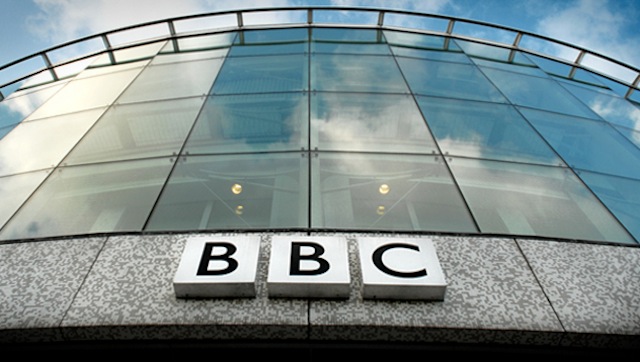 Several BBC programs on TV and radio — including flagship Today and Newsnight — failed to air on February 18 after journalists walked out at midnight for a 24-hour strike as part of a campaign against another round of job cuts. Journalists set up picket lines outside studios across United Kingdom after union leaders and managers failed to agree on the redeployment of about 30 staff of BBC Scotland, Radio 5 Live, the Asian Network and the World Service facing the axe. The job cuts are driven by a fall in the revenue BBC gets from the license fee, which is paid by everyone in Britain with a television. This is the latest saga at the world’s biggest broadcaster, which is struggling to restore order in its ranks following the crisis over child sex abuse allegations.
Several BBC programs on TV and radio — including flagship Today and Newsnight — failed to air on February 18 after journalists walked out at midnight for a 24-hour strike as part of a campaign against another round of job cuts. Journalists set up picket lines outside studios across United Kingdom after union leaders and managers failed to agree on the redeployment of about 30 staff of BBC Scotland, Radio 5 Live, the Asian Network and the World Service facing the axe. The job cuts are driven by a fall in the revenue BBC gets from the license fee, which is paid by everyone in Britain with a television. This is the latest saga at the world’s biggest broadcaster, which is struggling to restore order in its ranks following the crisis over child sex abuse allegations.
Read more on Rappler. - Network war rages on
 Two of the Philippines biggest media groups have yet to move on from a 2004 incident wherein ABS-CBN’s live feeds of an arriving overseas Filipino worker Angelo dela Cruz who was kidnapped by Iraqi militants aired on GMA-7. Warrants of arrest over libel charges that GMA-7 filed against ABS-CBN chair Gabby Lopez and 12 other former and current ABS-CBN executives and employees led to the posting of bail before the Quezon City Regional Trial Court on February 18. GMA7 sued ABS-CBN following accusations of “stealing” and “pirating” the live feeds aired in a news show. The Court of Appeals dismissed the case in 2011, but Justice Secretary Leila De Lima ordered prosecutors to file the libel charges against ABS-CBN in January 2012.
Two of the Philippines biggest media groups have yet to move on from a 2004 incident wherein ABS-CBN’s live feeds of an arriving overseas Filipino worker Angelo dela Cruz who was kidnapped by Iraqi militants aired on GMA-7. Warrants of arrest over libel charges that GMA-7 filed against ABS-CBN chair Gabby Lopez and 12 other former and current ABS-CBN executives and employees led to the posting of bail before the Quezon City Regional Trial Court on February 18. GMA7 sued ABS-CBN following accusations of “stealing” and “pirating” the live feeds aired in a news show. The Court of Appeals dismissed the case in 2011, but Justice Secretary Leila De Lima ordered prosecutors to file the libel charges against ABS-CBN in January 2012.
Read more on Rappler here and here. - Sports world mourns death of Lakers owner
 Jerry Buss, who guided the Los Angeles Lakers to an unprecedented run of success over the past 3 decades, died February 18. He was 80. Buss won 10 NBA titles as owner of the Lakers, more than any other team owner in league history, after purchasing the Lakers, ice hockey’s Los Angeles Kings, their arena and a ranch from Jack Kent Cooke for $67.5 million in 1979. NBA “lost a visionary owner whose influence on our league is incalculable and will be felt for decades to come,” NBA commissioner David Stern said. He is best known for his commitment to attracting and paying for the sport’s best talent, including Magic Johnson, Kareem Abdul-Jabar, Shaquille O’Neal, and Kobe Bryant, as well as coaches Pat Riley and Phil Jackson in the past years.
Jerry Buss, who guided the Los Angeles Lakers to an unprecedented run of success over the past 3 decades, died February 18. He was 80. Buss won 10 NBA titles as owner of the Lakers, more than any other team owner in league history, after purchasing the Lakers, ice hockey’s Los Angeles Kings, their arena and a ranch from Jack Kent Cooke for $67.5 million in 1979. NBA “lost a visionary owner whose influence on our league is incalculable and will be felt for decades to come,” NBA commissioner David Stern said. He is best known for his commitment to attracting and paying for the sport’s best talent, including Magic Johnson, Kareem Abdul-Jabar, Shaquille O’Neal, and Kobe Bryant, as well as coaches Pat Riley and Phil Jackson in the past years.
Read more on Rappler. - Is TV good for kids?
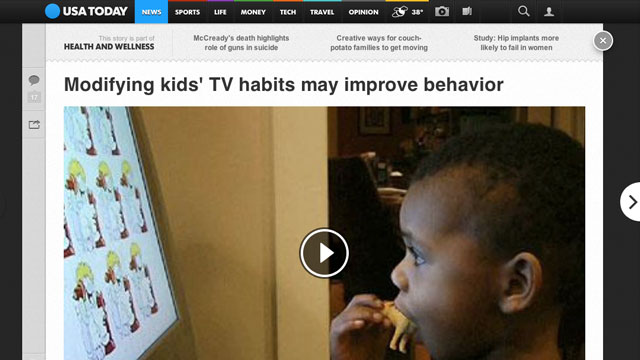 Two factors about kids watching TV have impact on behavior: the quality of the shows and the length of time preschoolers spend in front of the TV, a wide-reaching study released February 18 proved. If the kids age 3 to 5 are watching aggressive and violent shows, they are more likely to exhibit those tendencies. But if they watched the same amount of television but tuned in to shows shows that promoted healthy social interactions, they exhibited healthy social behaviors such as empathy, helpfulness and concern for others. The study looked at 565 families over 6 months.
Two factors about kids watching TV have impact on behavior: the quality of the shows and the length of time preschoolers spend in front of the TV, a wide-reaching study released February 18 proved. If the kids age 3 to 5 are watching aggressive and violent shows, they are more likely to exhibit those tendencies. But if they watched the same amount of television but tuned in to shows shows that promoted healthy social interactions, they exhibited healthy social behaviors such as empathy, helpfulness and concern for others. The study looked at 565 families over 6 months.
Read more on USA Today.
Add a comment
How does this make you feel?
There are no comments yet. Add your comment to start the conversation.